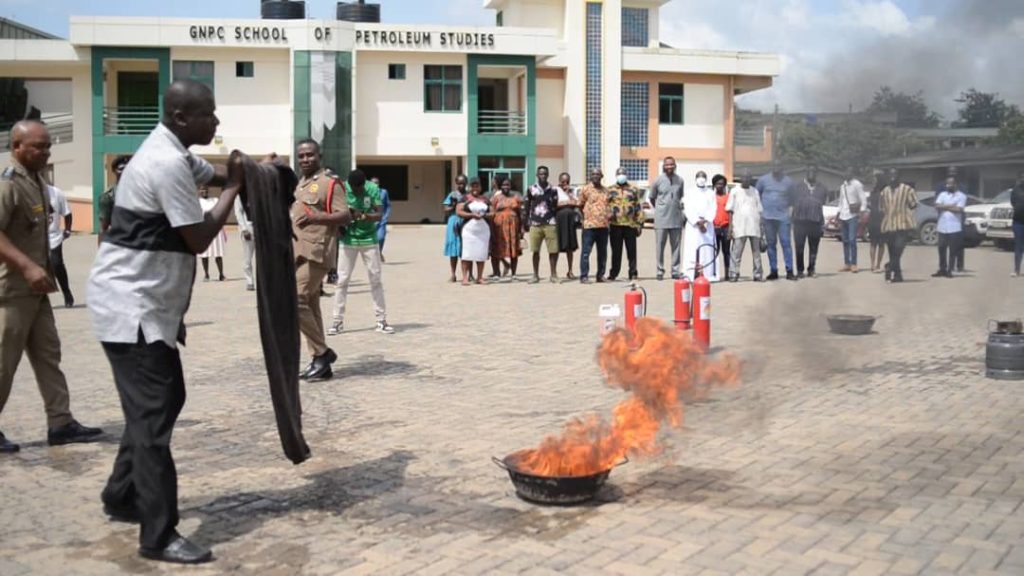By Erica Apeatua Addo,
Tarkwa (W/R), Dec. 11, GNA – The University of Mines and Technology (UMaT), Tarkwa School of Petroleum Studies has organized a research results dissemination workshop for stakeholders in the Liquefied Petroleum Gas (LPG) supply chain.
It was on the theme “safety assessment of the existing LPG supply chain for safe sustainable clean energy in Ghana. A case study of the Western Region”.
Participants included; the Driver and Vehicle Licensing Authority (DVLA), Ghana Private Road Transport Union (GPRTU), Ghana National Fire Services (GNFS) National Petroleum Authority (NPA), and hotel owners.
The research was conducted in the Western Region and some areas the team visited were Tarkwa, Takoradi, Asankragwa and many others, to help identify the safety and technical-related issues associated with the existing LPG supply chain.
Professor Richard Amorin, Vice Dean of the School of Petroleum Studies explained that from the survey, it was clear that most domestic users of LPG in the Western Region lacked basic knowledge on the safe usage of the gas.
He said “I think the findings have shown clearly that indeed usage is not as bad as one may perceive but the problem is how people are using the cylinders.

“Currently when you look at the urban communities many people are using LPG for their vehicles and cooking. We need to sensitize more communities so they can all come on board to help end the deforestation process that is ongoing”
For the refilling aspects, he said “we need to review the cylinders that are in the system, is good that the government has initiated the cylinder recirculation model but how soon will it get to all of us, so until then, the current system needs to be upgraded”
Professor Amorin indicated that after the research they recommended that as the Government was determined to increase access to domestic LPG usage to 50% by 2030, the move should be commensurate with sufficient safety protocols to minimize the LPG-related casualties recorded in the country.
In a speech read on behalf of Professor Micheal Affam, Dean Office of Research, Innovation, and Consultancy said the workshop was made possible with the support of the Ghana Chamber of Mines Tertiary Education Fund.
He said over the past three years, the fund has supported 40 faculty members and 80 post graduate students with funding to enable them conduct research that is of relevance to the mining industry and for national development.
“One of such projects is what we are about to listen to, learn from and take home with us useful information and skills in the effective use of LPG” he stated.
Prof. Affam said the assessment examined by the study included LPG storage, filling, distribution, and retail facilities for both domestic and commercial purposes, for safe, sustainable, clean energy for all. It also assesses the safety knowledge and use of domestic cylinders for safe usage across the region and by extension Ghana.
The project evaluated the safety of the LPG value chain for safe, sustainable clean energy for all to meet the SDGs 7 and 13. It is gratifying to note that apart from the Knowledge transfer a team from the GNFS will demonstrate how to fight LPG fire, he said
Prof. Affam implored the trainees to take the opportunity to broaden their knowledge and educate other members of the public to avoid casualties resulting from the wrongful use the LPG, adding, “I thank the Ghana Chamber of Mines for their immense support to the UMaT in diverse ways and also congratulate the research team for a good job done”.
The Tarkwa Divisional Officer of the GNFS (DO) Grade II Alex Assiem in his presentation advised that cylinders be transported in an upright position and stored in a well-ventilated place to prevent the accumulation of gas vapors.
Mr David Amankwa, District Manager of DVLA Tarkwa, on his part stated that LPG systems should be installed and maintained by certified professionals who adhered to local regulations and standards.
GNA